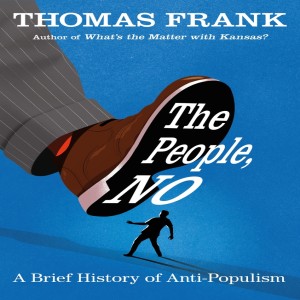
Parallax Views w/ J.G. Michael
Society & Culture

On this edition of Parallax Views, populism has become a dirty word since the election of Donald J. Trump to the U.S. Presidency in 2016. But is Trumpism really representative of populism? And is populism really just the reign of the violent mob or the ignorant masses over more benevolent and enlightened souls? Thomas Frank, co-founder of The Baffler and the noted author of such books as What's the Matter With Kansas? and Listen, Liberal!, argues otherwise in his sweeping defense of populism The People, No: A Brief History of Anti-Populism. In examining the history of anti-populism in American thought from the late 1800s to today, Frank concludes that populism is pro-democracy while it's polar opposite, anti-populism, is, in fact, elitist. Thomas Frank joins us to discuss this fascinating history. Among the topics covered:
- How populism became a dirty word
- The early populist William Jennings Bryan, his accomplishments, and his eventual fall from grace
- The populism of FDR
- Demagogues of the 1930s like the anti-semitic radio personality Father Charles Coughlin and why he does not consider them populists
- Pop culture that dealt with populism in that era, specifically the films of Frank Capra and the Orson Welles class Citizen Kane (which just happen to be Donald Trump's favorite movie; does Trump miss the message and is it really and anti-populist movie?)
- The early 20th century progressive historians like Charles Beard and how the consensus historians of the mid-20th century, particularly Richard Hofstadter, thought to push back on their work vis-à-vis anti-populism
- How Hofstadter and other anti-populists consensus historians were reactions to Joe McCarthy and the Red Scare's attacks on intellectuals of the time; Hofstadter's The Age of Reform, a key anti-populist text, and how, despite being debunked and refuted, still maintains an influence today.
- The professionals and intellectuals of managerial class that were flattered by the work of Hofstadter and the consensus historians; the displacement of the old elite by the "Meritocracy" or new meritocratic elite.
- How the new elites never considered their own pathologies and the potential of elite failure.
- The consensus historians concepts of pluralism and representative democracy; Edward Shils' belief that "there must be affinity among the elites"; the so-called "end of ideology" and associated ideas like Francis Fukyama's "the end of history"
- Interrogating the concept of meritocracy and "hereditary meritocracy"; the 2019 college admission bribery scandal (or "Collegegate") that was exposed by the FBI's Operation Varsity Blues and what it says about contradictions of the meritocracy espoused by the new elites.
- The Best and Brightest by David Halberstam, the classic work on elite failure in the Vietnam War era.
- Being part of the "liberal intelligentsia" after the success of What's the Matter With Kansas? and the mis-readings of What's the Matter With Kansas?
- The cultural of liberal scolding and Frank's discomfort with its popularity; liberal and elite misanthropy; are people like Frank catching elites with their pants down by exposing the misanthropy underlying their supposedly compassionate image.
- What does the future hold? Will the pessimism toward "the people" by elites continue or will a new zeitgeist emerge to challenge our current cultural moment?
More Episodes
Create your
podcast in
minutes
- Full-featured podcast site
- Unlimited storage and bandwidth
- Comprehensive podcast stats
- Distribute to Apple Podcasts, Spotify, and more
- Make money with your podcast
It is Free
- Privacy Policy
- Cookie Policy
- Terms of Use
- Consent Preferences
- Copyright © 2015-2024 Podbean.com






